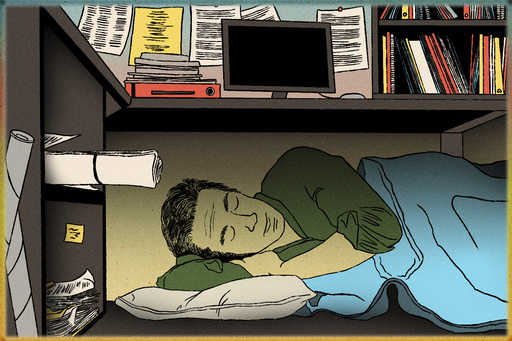
NEW YORK — Across the United States, a growing segment of the workforce is carving out time for naps, taking solace in the quiet corners of parking garages, the comfort of rented nap pods, or even their own beds while engaged in remote work.
This emerging group, inspired by historical figures like Winston Churchill and Albert Einstein, has begun promoting the benefits of brief naps, which many believe can boost cognitive function. Despite these advantages, napping during work hours remains a controversial topic, often associated with laziness in American culture. Federal regulations even prohibit daytime napping in government workplaces, barring rare exceptions.
However, there is an increasing willingness among individuals to embrace and advocate for the benefits of short sleep breaks. Marvin Stockwell, the founder of the PR firm Champion the Cause, shares that his several weekly naps significantly enhance his productivity. “These naps recharge me in a way that I’m far more effective and creative afterward than when I push through fatigue,” he stated.
The importance of adequate sleep is increasingly recognized as comparable to diet and exercise. Yet, many people struggle to get sufficient rest, largely due to the addictive nature of electronics. James Rowley, director of the Sleep Medicine Fellowship at Rush University Medical Center, notes that devices such as cellphones disrupt sleep patterns for many—echoing a trend previously set by televisions.
In academic circles, the norm is less accommodating toward napping due to persistent publishing pressures. Nonetheless, some, like Julianna Kirschner, a lecturer at the University of Southern California, manage to sneak in naps. She attributes her occasional need for sleep to the dopamine-driven nature of social media, which is known to disrupt healthy sleep-hygiene practices. Rowley emphasizes that the most effective naps are brief, ideally lasting only 15 to 20 minutes to avoid grogginess upon waking.
Timing is also crucial when it comes to napping; mid-afternoon is often recognized as the best moment to recharge, aligning with natural circadian rhythms. Michael Chee, director of the Centre for Sleep and Cognition at the National University of Singapore, suggests that any nap duration can offer cognitive benefits. A study reviewed by Ruth Leong, a research fellow at the Singapore center, determined that 30 minutes is the most practical and beneficial nap length, while naps exceeding two hours can negatively impact nighttime sleep.
Interestingly, some companies are bucking the trend of naptime stigma. Will Bryk, founder of the AI startup Exa, passionately supports short power naps and has provided sleeping pods for his employees in San Francisco. Meanwhile, Ben & Jerry’s has maintained a nap room at its Vermont headquarters for years, affirming that a well-rested staff is more conscientious and productive.
Arianna Huffington, co-founder of the Huffington Post, became a sleep advocate after experiencing a health scare caused by exhaustion. Following this personal revelation, she established nap rooms at her previous workplace and her current wellness company, Thrive Global. She believes that allowing employees to nap can lead to heightened productivity and creativity, particularly for those facing demanding schedules.
Kirsten Perez, 33, understands the benefits of naps intimately. She has turned her lunch breaks into brief periods of rest in her car and later her office. Now that she works from home for Nvidia, she usually takes quick naps in bed, timing herself to maximize her recharge. “I can definitely tell when my concentration dips, and I need a break to reset,” she shared.
In certain professions, napping is not only accepted but often necessary. The CDC actively supports napping for nurses working night shifts, although access to suitable sleeping arrangements is often limited. Michelle Morris from the National Nurses United union highlighted the challenges nurses face amidst overwhelming work demands, which frequently prevent them from taking much-needed naps.
Entrepreneurs like Neil Wong aim to alleviate this issue through ventures like Nap York, where clients can rent sleeping pods in New York City. His business caters to various professionals, including long-distance commuters and essential workers, at reasonable hourly rates. Wong stresses the lack of accessible places for rest outside of home or hotels, creating a unique niche in the market for nap-friendly environments.

